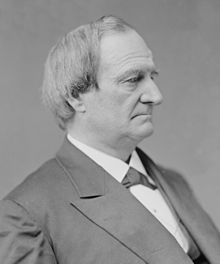Alphonso Taft | |
|---|---|
 | |
| United States Minister to Russia | |
| In office September 3, 1884 – July 31, 1885 | |
| Appointed by | Chester A. Arthur |
| Preceded by | William H. Hunt |
| Succeeded by | George V. N. Lothrop |
| United States Minister to Austria-Hungary | |
| In office June 30, 1882 – August 25, 1884 | |
| Appointed by | Chester A. Arthur |
| Preceded by | William Walter Phelps |
| Succeeded by | John M. Francis |
| 34th United States Attorney General | |
| In office May 22, 1876 – March 4, 1877 | |
| President | Ulysses S. Grant |
| Preceded by | Edwards Pierrepont |
| Succeeded by | Charles Devens |
| 31st United States Secretary of War | |
| In office March 8, 1876 – May 22, 1876 | |
| President | Ulysses S. Grant |
| Preceded by | William W. Belknap |
| Succeeded by | J. Donald Cameron |
| Personal details | |
| Born | November 5, 1810 Townshend, Vermont, U.S. |
| Died | May 21, 1891 (aged 80) San Diego, California, U.S. |
| Resting place | Spring Grove Cemetery Cincinnati, Ohio, U.S. |
| Political party | Republican |
| Spouses | |
| Children | 6, including Charles, William, Henry, Horace |
| Parents |
|
| Education | Yale University (BA) |
| Signature | |
Alphonso Taft (November 5, 1810 – May 21, 1891) was an American jurist, diplomat, politician, Attorney General and Secretary of War under President Ulysses S. Grant. He was also the founder of the Taft political dynasty, and father of President and Chief Justice William Howard Taft.
As Secretary of War, Taft's popular appointment by Grant did much to restore the integrity of the War Department. Taft reformed the War Department by allowing commanders at Indian forts to choose who could start and run post traderships, and by making reductions in wasteful military spending. While serving as Attorney General, he strongly held that African Americans must not be denied the right to vote through intimidation and violence.[1] Attorney General Taft coauthored a bill to Congress, signed into law by President Grant, that created the Elections Commission that settled the controversial Hayes-Tilden presidential election.[2]
Taft was appointed as minister to Austria-Hungary by Chester A. Arthur in 1882. He served until July 4, 1884, and was then transferred by President Arthur to Minister of Russia, and he served in St. Petersburg until August 1885. Taft had a reputation for serving political office with integrity and character. Taft was a rare and modern 19th century politician who supported black voting rights and who reduced government corruption while holding office.
- ^ New York Times (October 26, 1876)
- ^ Pringle 1936, p. 264.